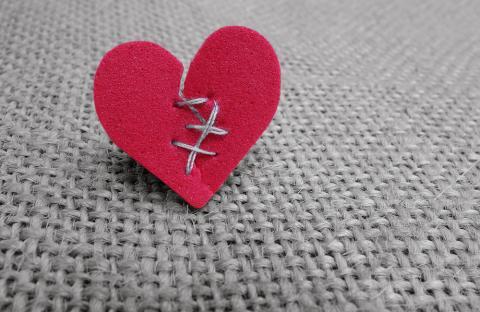
So why does the heart hurt? It’s not a physical pain unless you are having a heart attack. The heart itself is not hurting, or wounded, or even broken. What happens is a physical manifestation of the emotional pain that you are feeling. There is an intense sadness because a loved one has left you or deserted you. And you end up channeling it into small bombs of pain that seem to hit you everywhere. You are sad and depressed, and want life itself to end. To compensate, some of us tend to build walls around our heart. But basically, we are building these walls around ourselves. No person is an island—human beings are social animals. We need people around us to love us and for us to love them. Being stone-hearted would only put us on a solitary path to despair and loneliness.
What we need to do is heal the hurt and make ourselves move on and away from the pain, rather than from the thought of pain. If you knew that you can heal, then you would open out that heart again. You would let it feel and breathe and be a beautiful thing all over again. But healing the heart is not as easy as it sounds. It takes time, effort, and practice. It takes courage and fortitude. It takes forgiveness and hope. It takes a whole gamut of emotions—but the end result is worth it!
Step One: Let The Pain Wash Over You
Step Two: Nip Any Hope In The Bud
For a long while after having your heart broken, you don’t stop hoping. You hope the person who left you will realize their “mistake” and come back to you on their knees. You dream of them begging for your forgiveness. Or if you just lost someone to the great void, you hope that they’ll be back. You weave intricate stories of miraculous survivals. You dream of hands reaching out to you from beyond the boundaries of life and death. Crush this hope as brutally as possible. They are not coming back. You have a death in the family—be it of the relationship or the person. Mourn it as much as you want and vent out the grief, but this hope that you’re nursing in your heart needs to be nipped in the bud. They left and they will not be back. It is you who has to move on. Remember that the hope you feel has to be grounded in something, else, it’s just hot air…
Step Three: Be Grateful For What They Brought Into Your Life
You can curse them, berate them or hate them all you want, but this will not help in healing your heart. It’s like this: if you have a physical wound, you sterilize it. Then you put on an anti-bacterial salve or powder and dress it up in bandages. You change the dressings and keep the wound dry and air it till it heals. It’s the same with a broken heart: the heart is hurt and so it bleeds—and obviously, there is the pain. So you hiss and sputter and let out those tears. Then you crush the hope of that person coming back to you—this is how you sterilize the wound. Finally, the anti-bacterial salve is the gratitude you need to feel for what that person brought in your life. They may have left you with a world of pain but before that, they added to your life and to your strength in various ways. They were part of your life for a reason. Embrace the joys that were and the pain that is—it is what makes you, you.
Step Four: Forgive Yourself & Them Both
Now, this is important—when you forgive someone who has hurt you, it means you harbor resentment and anger. Before you “forgive” those who caused you pain, look at their actions from another perspective. Try to understand what they did and why they did it, from the heart’s view. They are not perfect; they have their own failings as a person. Recall the love you had for each other and see that person with a non-jaundiced heart. You might find your compassion come to the fore. And when it does, so will the forgiveness come. Forgive that person and forgive yourself. If you harbor a grudge against the Powers That Be, forgive them too. The darkest storm clouds often bring a silver lining. Let the storm pass and the day dawn—the rainbow that forms will gladden your heart into healing.
Step Five: Cleanse It Out
When we have been ailing or sick for a while, we do begin to get better. There comes a day when you strip down those dirty clothes and have a long, cleansing bath. And recovery is much faster from that moment on. So now, after your heart has been ailing and hurting, it’s time to put it back on the road to recovery. Cleanse your heart out of those painful memories and wash it down with tears of grief. Do what needs to be done—burn their stuff, move houses, or take a long solo trip to wherever it is that you want. Go backpacking or trekking. Burn some calories at the gym or at kickboxing. Dance your grief away, sing it away, and just chase it away with all the glory of life.
Do this five-step healing therapy for your heart yourself. And if you find yourself back at square one, do them all over again. The heart hurts but time, as they say, is a great healer. I leave you with these lines of Rumi, “This is love: to fly toward a secret sky, to cause a hundred veils to fall each moment. First to let go of life. Finally, to take a step without feet.”
Be well, be hopeful, and definitely, do be in love. If not with someone, love yourself!








